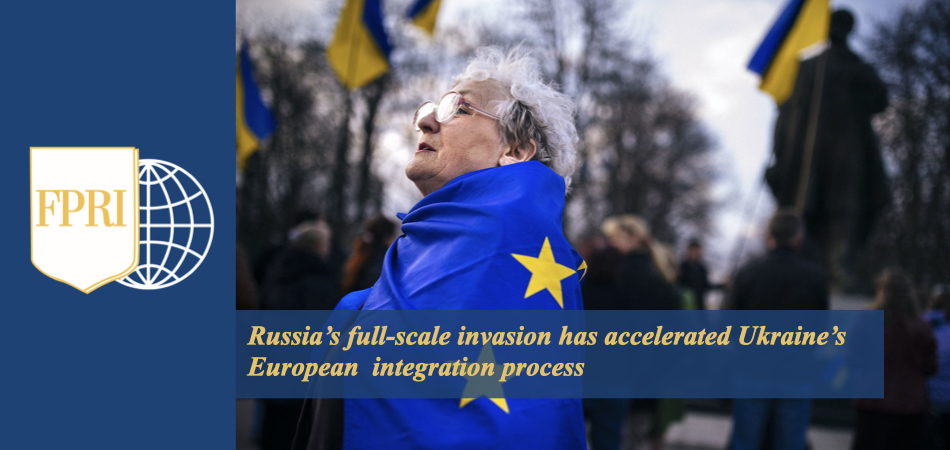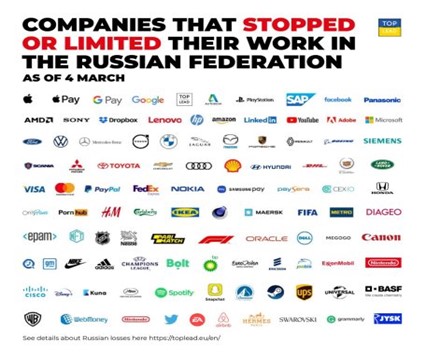
Source: Time
The Ukrainian people are currently paying a heavy price for their independence, their right to exist and their commitment to the principles of democracy professed by the European Union. In contrast to authoritarian Russia, Ukraine has made progress since independence in building democratic institutions and developing civil society and remains just about the only country in the post-Soviet space. The current war on the territory of Ukraine has become an opportunity for the Ukrainian people to finally get out of the Russian Federation sphere of influence and become an equal member of the European community.
Ukraine's aspirations are understood and supported in the European Union. The main partners and lobbyists of Ukraine are first of all Eastern European countries. Now there is another powerful factor - the support of European society. According to a poll conducted by the French Jean Jaures Foundation (an authoritative organization close to the Socialist Party) and the Ukrainian Yalta European Strategy (YES), the vast majority of European citizens support Ukraine's accession to the EU. Between third and seventh of March, sociological companies surveyed more than 4,000 people in representative samples representing the population of Germany, France, Italy and Poland over the age of 18. The level of support turned out to be the smallest in France, but still it is high there - 62% of citizens support the accession, 38% oppose it. In Germany, support for accession is significantly higher, with 69% saying they are in favor of Ukraine's membership in the EU. In Italy, there are even more supporters of accession, 71%. Due to the even higher level of support in the east of Europe (in Poland - 91%), researchers believe that all-European support is at the level of about 71%.[1] Therefore, in his latest regular addresses, Volodymyr Zelenskyy appeals primarily to European civil society, while the Ministry of Foreign Affairs of Ukraine even calls on Europeans who are not indifferent to Ukraine to check the position of the deputies representing them in government bodies.
The countries of the European Union provide strong support to Ukraine against the background of Russian aggression. This includes financial, humanitarian and political assistance, as well as sanction pressure on Russia and assistance to Ukrainians who are forced to flee to the territory of EU member states. However, according to Ihor Zhovkva, Deputy Head of the Office of the President of Ukraine, the level of pressure on Russia is currently insufficient and the EU must strengthen sanctions so as to quickly stop the Russian economy, which in turn will «stop the war». [2] According to Bloomberg, the war against Ukraine has already reduced Russia's GDP by $ 30 billion, or 9%. Because of the Russian invasion of Ukraine, the aggressor country's economy has now the highest decline since the 1990s. This was facilitated not only by the direct sanctions of the states that opposed the Kremlin's criminal actions, but also by the unprecedented reaction of business. Russia has become toxic and a large number of companies decide to leave the Russian market on their own will.

Source: Ukraine Business News
At the same time, given that Russia's aggression continues, the economic blow remains ineffective and takes time to force the Russian leadership to stop the offensive. In addition, a number of companies are trying to circumvent sanctions, take half-steps to wait for the results of the war and return to the Russian market. At the Polish-Belarusian border, hundreds of trucks loaded with goods from Germany were blocked by pro-Ukrainian activists, although the German and Polish governments themselves should have prevented the supply of goods to Russia. Taking into account historical experience, the economic factor may not affect the actions of the Russian Federation. Therefore, military and political support is now of a bigger significance.
The Ukrainian leadership sees the security of the state within European security structures and has expressed a desire to join the European Union under an accelerated procedure, and this desire was supported by EU countries, although only in part. On March 10-11, the European Union adopted a joint statement in which the European Council recognized Ukraine's European aspirations, recognized that Ukraine belongs to the European family and invited the European Commission to provide opinions on Ukraine's, Moldova's and Georgia's applications for EU membership. Member states have also blamed Russia and Belarus for the war of aggression, saying they would be held accountable for their crimes, including indiscriminate attacks on civilians and civilian objects. The EU stressed its desire to support the reconstruction of a democratic Ukraine as soon as the Russian offensive ends. A few days after the decision was made on March 13, the head of the EU Delegation to Ukraine, Matti Maasikas, said that work on Ukraine's accession to the European Union has begun.
However, at present this does not mean granting Ukraine membership under the accelerated procedure, or granting Ukraine the status of a candidate for EU membership. There have been some changes in the perception of the Russian-Ukrainian war by Western European leaders, however, this is not enough to finally and fully accept the fact of Russia's threat to the whole of Europe. The policies of Western European countries are pragmatic and do not deviate from the basic principles of admission of new members. Probably, they see Ukraine as part of the EU only after the country meets the Copenhagen criteria.
Thus, the issue of Ukraine's accession has economic essence for them, not military-political. However, there is an obvious change both in the mood of political leadership and within the societies of European countries. After the war, Ukraine will have a chance to implement economic transformations that will allow the country to become a member of the European Union with the help of a number of reconstruction funds, which the Ukrainian media has already described as the «Marshall Plan for Ukraine».
The sentiments of European elites are reflected in the defense cooperation between Ukraine and NATO. On the one hand, Ukraine receives powerful military assistance, including anti-tank and portable anti-aircraft missiles, ammunition, drones, defenses, etc., on the other hand, the North Atlantic Alliance is delaying the transfer of heavy armored vehicles, artillery and fighters. The idea of ??closing the skies over Ukraine has not received widespread support among allies, the vast majority of whom still believe in the possibility of staying out of the way and not being drawn into a direct confrontation with Russia. However, within each country there are groups that support the closure of the skies over Ukraine, both among the population and among politicians.
The US position is of great importance. The Joe Biden administration is even afraid to transfer Polish planes to Ukraine so that the Ukrainians themselves can more effectively protect the airspace. The ping-pong between Warsaw, which did not dare to transfer planes on its own, without support from the Alliance, and Washington, which criticized this idea, became indicative. Thus, in the Third World War, which is already taking place on Ukrainian soil, the Russian Federation is fighting against all the countries of the Euro-Atlantic space and Ukraine is fighting for all the countries of the Euro-Atlantic space. According to the Financial Times, the PRC responded positively to Russia's request for military assistance.[3] The second army of the world can receive military assistance from the third army of the world to fight Ukraine.
At the same time, in Ukraine, NATO neither protects the people of Ukraine, nor its own security and the right of the European community to live in the way that all Europeans are accustomed to. For the second time in recent years, a Russian drone has crashed on the territory of the Alliance member countries. If the UAV accident in Croatia can be considered an unfortunate mistake of the Russian military, then the Orlan UAV that fell on the territory of Romania did not end up there by chance. While NATO hesitates to help Ukraine, Russian federal channels are directly discussing a plan to further seize Eastern European countries in order to ensure the «strategic security of the Russian Federation». If Ukraine does not resist, it will be a matter of time before Russian missiles fall on NATO territory instead of Russian drones.
NATO countries must counter Russia more effectively in order to repel Russian fascism as soon as possible. Ukraine now needs to strengthen air defense systems to protect the population from Russian missiles, as well as fighter jets to destroy miles of Russian army columns. The inclusion of Ukraine in the security structures of the Euro-Atlantic space will contribute to strengthening security on the continent. The Russian Federation has violated many international treaties and undermined the rules-based international order. Countries return to the world of Morgenthau, where force determines the system of relations between states. To preserve the hegemony of the United States and its allies and restore a world order based on rules, the North Atlantic Alliance must get rid of the illusion that it is possible to stay out of the war on the European continent. These illusions will be dispelled either by the appropriate decision of the NATO leaders, or by Russian missiles striking the territory of an Alliance member state.
Sources:
1. Абсолютна більшість німців, французів та італійців – за вступ України до ЄС, 13.03.2022,
URL: https://www.eurointegration.com.ua/news/2022/03/13/7135852/
2. Ігор Жовква, Час діяти швидко та рішуче: чому Україна має отримати статус члена ЄС, 11.03.2022,
URL: https://www.eurointegration.com.ua/experts/2022/03/11/7135784/
3. Олена Коваленко, Китай готовий надати Росії військову підтримку - Financial Times, 14.03.2022,
URL: https://www.unian.ua/politics/kitay-gotoviy-nadati-rosiji-viyskovu-pidtrimku-financial-times-novini-ukrajina-11743708.html?_ga=2.33403390.1194034483.1647209028-1375312599.1646522206
